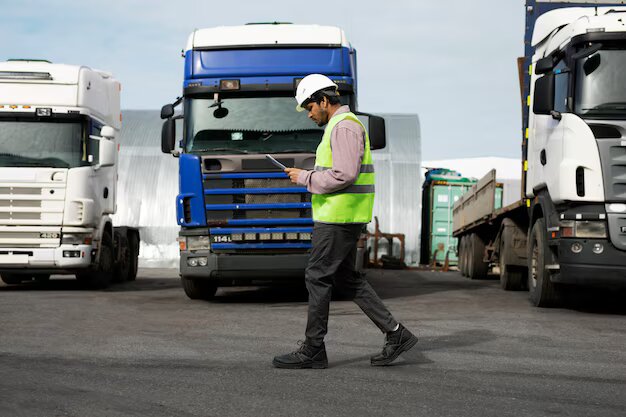In today's fast-paced world, where industries heavily rely on logistics and streamlined processes, dispatcher services have emerged as a crucial component in ensuring operational efficiency. A dispatcher service acts as the backbone for various industries, including transportation, emergency services, and logistics, by effectively coordinating tasks, resources, and communication. This blog explores the concept, benefits, and importance of dispatcher services, along with a closer look at their applications across industries.
What is a Dispatcher Service?
A dispatcher service is a centralized operational hub that manages and allocates resources to meet specific demands. Dispatchers coordinate schedules, monitor activities, and facilitate real-time communication between teams, vehicles, or equipment to optimize workflow.
Dispatchers are generally found in the following types of services:
Transportation Services: Manage fleet schedules, routes, and driver assignments.
Emergency Services: Coordinate police, fire, and medical response units.
Logistics and Delivery: Optimize supply chain operations and delivery timelines.
Customer Service: Assigning tasks to field technicians or service agents.
Core Functions of a Dispatcher Service
The dispatcher’s role revolves around ensuring smooth communication and coordination between various operational units. The following are the core functions of a dispatcher service:
1. Resource Allocation
Dispatchers efficiently assign available resources, such as vehicles, drivers, or personnel, to tasks based on priority, availability, and urgency. Proper allocation minimizes downtime and maximizes productivity.
2. Real-Time Monitoring
With the aid of GPS tracking and other technologies, dispatchers monitor the movement and performance of resources. It ensures that any delays or issues are identified and resolved promptly.
3. Communication Management
A dispatcher acts as a communication bridge between field personnel and central operations. He relays important updates, instructions, or changes to avoid confusion and error.
4. Schedule Optimization
By analyzing routes, availability, and workloads, dispatchers optimize schedules to reduce costs, save time, and enhance efficiency. For example, in logistics, route optimization can considerably cut down fuel consumption and delivery times.
5. Crisis Management
During emergencies, dispatchers play a crucial role in coordinating speedy responses by analyzing the situation and deploying the nearest and most apt resources.
Benefits of a Dispatcher Service
Implementing an efficient dispatcher service brings numerous benefits to an organization:
1. Improved Efficiency
Dispatchers streamline workflows, enabling organizations to handle more tasks with the same resources. This translates into higher productivity and better resource utilization.
2. Cost Savings
Optimized routes and schedules reduce operational costs, including fuel consumption, labor costs, and wear-and-tear on vehicles or equipment.
3. Enhanced Customer Satisfaction
In fact, timely and accurate delivery services foster customer trust and loyalty. This includes timely delivery of packages as well as prompt response to emergencies and calls by the dispatcher.
4. Efficient Decision Making
Dispatchers provide real-time data and insights that help organizations take appropriate decisions, correct inefficiencies, and strategize about future plans.
5. Reduced Risk and Downtime
Effective communication and monitoring enable dispatchers to act proactively against potential problems, thus reducing delays, accidents, and operational shutdowns.
Applications Across Industries
1. Transportation and Logistics
In transportation, dispatchers are the most critical functions in route planning, assigning drivers, and tracking vehicles. For example, Uber, a ride-sharing company, heavily depends on dispatchers to match passengers with drivers in real-time.
In logistics, dispatchers ensure timely delivery by optimizing routes and addressing unexpected challenges such as traffic or weather conditions.
2. Emergency Response
In emergencies, every second counts. Dispatchers coordinate police, firefighters, and paramedics by deploying the nearest available units to the incident site. Their role is indispensable in ensuring quick and efficient responses to save lives and property.
3. Field Services
In industries such as telecommunications or utilities, dispatchers assign technicians to service requests based on proximity, expertise, and availability. This ensures quicker problem resolution and enhanced customer satisfaction.
4. Healthcare and Ambulance Services
Healthcare dispatchers are in charge of patient transport, emergency calls, and equipment allocation. They work hand-in-hand with medical teams to ensure timely and effective care.
5. Retail and E-Commerce
With the rise of online shopping, there is a growing need for efficient delivery systems. Dispatchers in this industry ensure smooth delivery operations by managing fleets, monitoring driver performance, and coordinating with warehouses.
Challenges in Dispatcher Services
However, like anything, dispatcher services have their issues with challenges. These include:
High Pressure and Stress Dispatchers generally tend to be subjected to high-pressure environments, more especially within emergencies or critical industries where wrong decisions can be very consequential.
Technical Dependency In many ways, modern dispatching is very dependent on technology in forms of GPS and communication. A glitch in the technical aspect can throw operations off course and increase the delay.
Balancing Multiple Priorities Managing multiple tasks, resources, and stakeholders simultaneously can be overwhelming without proper systems in place.
Data Overload With the influx of real-time data, dispatchers must filter relevant information to make effective decisions, which can be challenging without advanced analytical tools.
Future Trends in Dispatcher Services
The dispatcher service industry is on the cutting edge of integrating advanced technologies in the area of artificial intelligence, machine learning, and automation. These innovations reshape traditional dispatching by enabling predictive analytics, autonomous routing, and intelligent resource allocation.
For instance:
AI-Powered Dispatching: AI algorithms could predict traffic patterns, optimize schedules, and even automatically allocate resources.
IoT Integration: Internet of Things (IoT) devices bring real-time updates on conditions of equipment or vehicles for better, proactive decision-making by dispatchers.
Mobile Applications: Friendly applications increase interaction between dispatchers, field personnel, and customers and, therefore enhance the quality of service.
Conclusion
Dispatcher services are no longer a luxury in modern operating environments. Ensuring timely deliveries, managing emergency-related issues, and coordinating field operations require one central headquarters: the dispatcher. The progress of technology will see the role of dispatchers evolve and change, ensuring that increased precision, productivity, and profitability are reached by organizations.






.jfif)
